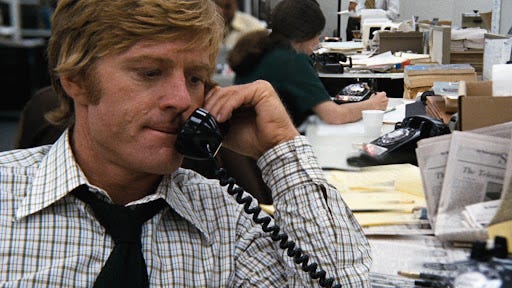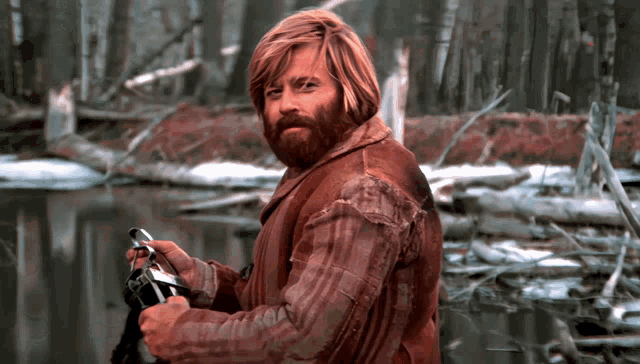Upon learning of the death of Robert Redford earlier this week, I thought of two of his performances straightaway: his role as “Our Man” in J.C. Chandor’s 2013 disaster film All Is Lost and his far more indelible turn as Bob Woodward in All the President’s Men.
Why those two? Well, they meant the most to me personally. I went to the very same journalism school as Carl Bernstein—the other half of the reporting partnership highlighted in the All the President’s Men—and that particular story, as portrayed in the book and the movie, remains the Platonic ideal of the profession I chose and subsequently left.1
All the President’s Men is as obvious as All Is Lost is not. The latter film is obscure—at least in the context of Redford’s career—but its simple setup, as-narrow-as-it-gets focus, and sparing dialogue left a different kind of mark. It showed me just how minimalist a film could be, while still being absolutely riveting. There is a vast ocean, a storm, a sailboat, and, eventually, a tanker ship. Mostly, though, there is Redford, keeping you glued to the proceedings even as he grunts and mutters his way through each scene, hardly uttering a word aloud.
I’ll leave it to others to more fully evaluate Redford’s on-screen persona. His always-twinkling eyes and ability to emit steel and stoicism without feeling too cold or distant are the qualities that, to me, always seemed to make him a fit for whatever it was he was doing.
But that, of course, was only part of his legacy. I could go on and on about Butch Cassidy and the Sundance Kid or The Sting or all manner of other parts from his acting filmography—those two, in particular, were huge touchstones in my house, both as reference points for my parents and as introductions to the vast world of film that, well, preceded my birth. If I did go on and on about that, I’d be skipping his body of work as a director and his founding of the Sundance Institute, the non-profit that puts on the Sundance Film Festival every year. I’d even be skipping the fact that, to some younger people, he’s almost exclusively a meme—like one of the most famous ones.
Indeed, it’s hard to think of any person who has done more to shape movies in such a multi-faceted way, especially following the collapse of the studio system in the 1950s and 1960s.
Redford, of course, bridged that gap most visibly on screen. Butch and The Sting demonstrated what a hit was or would be as Hollywood got more fragmented and, frankly, grown up. But he also helped make it OK for actors to get behind the camera with his success as a director. And, perhaps most important of all, he championed independent film and independent artists through Sundance.
Most of the best films made every year now hail from outside of the mainstream Hollywood machine. The film world is better for it—far more varietal and interesting—and Redford, more than any other single individual, is responsible for those kinds of films getting a real platform.
I promise that this isn’t an exaggeration. It’s a testament to the work of Woodward and Bernstein, but, more sadly, also an indication of how the craft has totally fizzled out in the 21st century. We really ought to have another example by now, even if said example might still play second fiddle to this template for great journalism.




